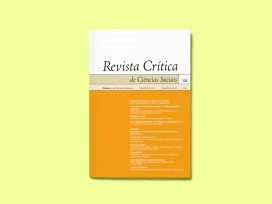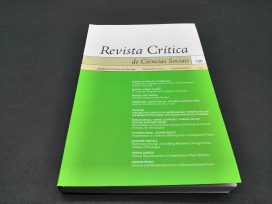Abstracts Revista Crítica 73 (2005)
Laura Cavalcante Padilha
From identity construction to a web of differences – A glance at literatures in Portuguese
Starting from an overview of Afro-Luso-Brazilian literary productions, this essay discusses the question of the Portuguese language, its expansion, and the web of differences that it encompasses. In order to achieve this broader goal, the author addresses two symbolic constructions which end up supplementing each other when, starting from the linguistic field, one makes ampler constructs. First, the essay focuses on the question of lusismo, understood as an identity construction which, within the space of Portuguese verbal artistic creation, projects itself at first in a euphoric mode, and then is problematized, often becoming dysphoric. The essay then discusses lusophony, understood, following Eduardo Lourenço, as a “mythology” which is only meaningful if one takes into account the existing identifications between the various intercontinental speakers of the language, on the one hand, and the differences which profoundly distinguish them, on the other.
Maria Ioannis Baganha
Immigration policy: The regulation of fluxes
The main goal of this article is to analyze the ways in which the various governments since Portugal’s accession to the European Community have regulated immigration, and the objectives they proposed to achieve. The work is essentially based on the analysis of two sets of documents, namely, legal documents that frame the entrance of non-Community migrants into national territory, as well as legal documents that establish special periods for the registration of illegal foreigners; and governmental interventions in Parliament related to the presentation of requests for legal authorization of the entrance of non-Community foreigners into the country and the launching of campaigns for the legalization of illegal foreigners. Based on an analysis of these documents, the author argues that policies for the regulation of fluxes have never achieved their aims, and that the regulation system has met with successive failures, leading to the need to set up special periods for legalization.
Paulo Henrique Martins
Marcel Mauss’s sociology: Gift, symbolism, and association
Marcel Mauss is better known as an anthropologist and ethnologist. Many are surprised to learn that he has also made a relevant contribution to sociology, having been one of the leading figures, along with Durkheim, behind the journal Année Sociologique, as well as the major systematizer of the theory of the gift. This theory is being recovered as an interpretative model that has great relevance for reflecting on the foundations of solidarity and alliance in contemporary societies. One of Mauss’s central contributions to sociology was to demonstrate that the value of things cannot exceed the value of the relationship, and that symbolism is fundamental for social life. He came to this view through the realization that the modes of exchange in archaic societies are not just things of the past, but have a fundamental importance for the understanding of modern society.
Maria Alice Nunes Costa
Does doing good bring rewards? An essay on corporate social responsibility
This article presents an overview of current business management, or corporate social responsibility, developed since the 1990s. The author seeks to understand the political implications of this form of social solidarity in which economic agents intervene in the public space, promoting social welfare policies for low-income communities. The aim is to reflect on corporate social responsibility, not in an isolated manner, but taking into account a dynamic that involves an interface with the State and the community in the governance of contemporary social regulation.
Jacob Carlos Lima
New production spaces and old-new forms of labour organization: The experiments with worker cooperatives in the Brazilian Northeast
This article analyzes the new industrialization of the Brazilian Northeast, resulting from policies of industrial attraction from the 1990s, and characterized by fiscal incentives to labour-intensive industries, such as footwear and clothing, and by inducing the organization of worker cooperatives to outsource production and reduce labour costs. This process was more significant in the state of Ceará. Cooperatives were set up in the interior of the state, where there was an abundant and cheap supply of labour, no other employment options, and non-existent union activity. This process took place in a context of economic restructuring and neoliberal political changes in the Brazilian state, marked by the opening of the internal market to exports, the denationalization of production sectors, industrial relocation, and technological modernization.
João Carlos Graça
When one comes down to it, what is the New Economic Sociology?
Placed somewhere between economics and sociology, economic sociology has enjoyed an unstable theoretical status and a restricted academic recognition. More recently, the project of the so-called New Economic Sociology (NES), beyond the diversity of contributions it has received, has been defined on the basis of postulates that reject both the model of the “rational agent” and the cultural determinism that made Parsonian sociology famous, the option being methodological postulates of a “third way” in which a culturally-framed rationality predominates. Are there reasons to question the intrinsic coherence and viability of that which the NES represents? Can it be considered not so much from the point of view of the reliability of its own theoretical project, but primarily as an issue of academic “small world” networks?
Published 10 April 2006
Original in Portuguese
Contributed by Revista Crítica de Ciências Sociais © Revista Crítica de Ciências Sociais Eurozine
PDF/PRINTNewsletter
Subscribe to know what’s worth thinking about.



